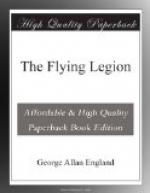“Here is water—real water! Drink!”
She obeyed, hardly more than half conscious. He gave her all he dared to have her drink at once, nearly half. Then he set down the jar, loosened the sack from his shoulders which were cut raw with the chafing of the thongs, and bathed her face with a little of that other water which, though bad, still might keep life in them.
“This may be an insane waste,” he was thinking, “but it will help revive her. And—maybe—we shall find another, better oasis.”
Out across the plain he peered, over the sun-dried earth, out into the distances shrouded with purple mists. His blurred eyes narrowed.
“Why, my God! There’s one, now!” he muttered. “A green one—cool—fresh—”
The Master laid the woman down again in the shadow, got up and staggered out into the blinding sun. He tottered forward, laughing hoarsely.
“Cool—fresh—” The words came from between parched lips.
All at once the oasis faded to a blur in the brilliant tapestry of the desert that beckoned: “Come to me—and die!”
The Master recoiled, hands over eyes, mouthing unintelligible words. Back beside the woman he crouched, fighting his own soul to keep it from madness. Then he heard her voice, weak, strange:
“Have you drunk, too?”
“Of course!”
“You are not—telling me the truth.”
“So help me God!” His fevered lips could hardly form the words. “There, in the hut—I drank. All I needed.”
She grew silent. His conscience lapsed. They lay as if dead, till almost evening, under the shelter of the blessed shadow.
The rest, even in that desolation, put fresh life into them. At nightfall they bound up their feet again, ate the dry dates and again set their blistered faces toward the Red Sea.
The woman’s basket was now light, indeed, across her shoulders. Not all her begging had induced the Master to let her carry the water-jug there. This, too, he was carrying.
All night long, stopping only when one or the other fell, they ploughed over basalt and hornblende schist that lacerated their feet, over blanched immensities under the steel moon, across grim, black ridges and through a basin of clay, circled by hills.
Strange apparitions mocked and mowed before them, but grimly they gave no heed. This, they both realized in moments of lucidity, was the last trek. Either they must find the sea, before another night, or madness would sink its fangs into their brains. And madness meant—the end.
Their whole consciousness was pain. This pain localized itself especially in their heads, round which some jinnee of the waste had riveted red-hot iron bands. There was other pain, too, in the limping feet cased in the last of the babooches, now stiffened with blood. And in the throat and lungs, what was this burning?




